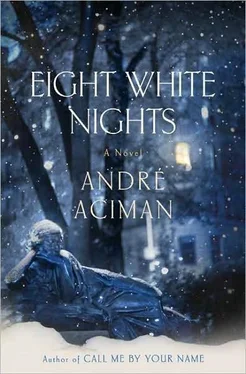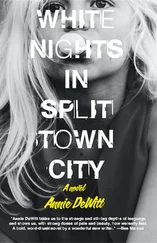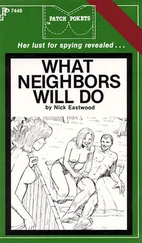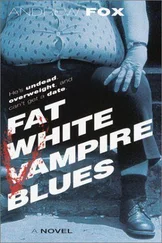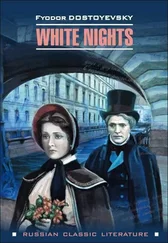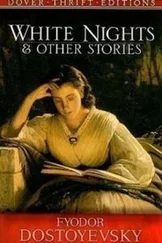“Love spices.”
“Loves spices.”
I was about to drop the meatball into my mouth when she asked me to wait.
Was she going to impose one of those intricate rituals that people who’ve just come back from the exotic spots adopt and try to foist on their baffled dinner guests?
“I must warn you, it’s very, very spicy.”
“How do you know?”
“Trust me.”
I loved the way we echoed each other’s words — and not just our words but the tone of our words, as if in exchanging these curt tit for tats we were being drawn into a magnetic field that required only that we yield to it. Our exchange made me think of a hand rubbing the soft down on someone’s velvet sleeve, back and forth, with the nap, against the nap, with the nap, against the nap, as though the meaningless words we volleyed between us were nothing more than stray objects picked up without notice and swapped from one hand to the other, from one person to the next, and all that mattered was the traffic and the gesture, the give and take, not the words, not the things, just the back and forth.
“Mankiewicz,” I said, as if toasting his health with his meatball and uttering an obscure spell meant to ward off evil. It reminded me of deep-sea divers who sit on the edge of a rowboat and mutter a one-word mantra before raising both thumbs and jumping head down, fins up.
“Mankiewicz,” she whispered in mock sullenness.
It would take me a while to realize that I should have heeded her warning, because a scalding sensation began to take hold of me, rising all over my scalp, then rippling down my nape. Tears welled in my eyes, and even before I knew what to do with them — hold them back, strike an attitude, spit out the food — they overflowed, streaming down my cheeks, while the fire in my mouth intensified each time I bit the food or tried to send it down. I fumbled for my handkerchief, feeling helpless and mortified, and then terribly frightened, because no matter how long I waited for the fire to subside, none of it was going away — because even after I’d swallowed the whole meatball, it kept getting worse, as though the first burst hadn’t even been a fire, and had nothing to do with the meatball itself, but was a preamble to a conflagration yet to come. Could it get any worse than this? Would I get sick? Would there be permanent damage to my body? I wanted to regain my composure and tell her what was happening to me, but my silence, my tears, my agony must have already told her enough. I threw my head back and found it resting on the window-pane, a chilly sensation which felt so welcome at that moment that, in my befuddled state, I understood why people loved huskies and why huskies thrived in cold weather and why, if I had my wish, I’d want nothing more than to become a husky too, roaming freely on the ice-cold banks of the Hudson immediately outside our window. Ask me again, Clara, whether I’m naked in the trenches now and I’ll tell you how deep and deadly is this dun-colored ditch I’ve fallen into and how desperately I’m struggling to come out; all I want is snow, ice, more ice.
Clara was staring at me uneasily, as if I had fainted and was just coming to. She offered me a piece of bread, which, I realized, she had purposely placed on the plate, to follow the peppered meatball. I suddenly wished her mouth was on fire as well. I wanted her to feel as flustered, shaken, and naked as I felt just now, so that I wouldn’t be alone in this, and with fire in both our mouths and tears streaming on our faces we might find one more thing to draw us closer — no words, no quips, no speeches — just our mouths burning as one mouth together, making love before we even knew we were.
Yet there she sat, leaning toward me, tranquil and collected, smiling probably, like a nurse bending down to wipe the sweat off a wounded soldier’s face with a damp sponge. I thought of how the soldier might reach out to hold her hand and, because he’s lost so much blood, opens up his heart to someone who, in other circumstances, would never have given him the time of day. Was she worried? Or would she wait for me to get better before jeering at me, I warned you, didn’t I, but did he listen — did he listen? Just touch my face with these lips, Clara, touch me with your lips, your jeering, taunting lips, touch me with your thumb, Clara, dig into my mouth and pull out the fire, with your thumb and your tongue.
What made things worse was the shame of it. Was there anything I could do to dispel the indignity of being just a writhing human body? I tried to comfort myself by spinning feel-good platitudes — that our body is who we are, that our body knows us better than we do, that showing all was far better than my smokescreen of words, that this went to the heart of things. But I couldn’t bring myself to believe it.
Or perhaps things were more complicated than I thought. For part of me liked nothing better than to show her how I was put together and where things easily came apart — the thrill of laying myself as bare and open as an anatomy book where you lift one transparency after the other to show the color of fire in my gullet and of the quiet hysteria coiled around the telltale organs of shame, the pleasure of my shame, of my petty, paltry, startled shame — a shame one puts on and tries hard to believe exists and even struggles to overcome, when, all along, as in nudist colonies, it was left in a locker with our watch and our wallet.
I tried to mumble something to cover up my agitation. But, like the stag in Ovid, had no voice left, or, sensing that something between a husky squawk and a puny squeal would come out and embarrass me further, I feigned having lost all speech. I wanted to moan. I wanted us to moan together, to moan and moan and moan, as if we’d become doe and hart, doe and hart, moaning together in a winter-blown forest where lovers never part.
So here was her piece of bread. And here I was, trying to show it was totally unnecessary, that I’d been through this before and would come out whole, just give me a moment, I’ll be done in a sec, just let me save face, stop staring — the wounded soldier stanching and stitching the wound himself — there!
But she sat like a watchful nurse who is paid by the hour and won’t leave until the patient swallows every last pill the doctor prescribed.
“Here, take this piece of bread,” she said, “and hold it in your mouth, it might help.” I am Clara, the merciful.
And I took it the way one might take a handkerchief, without struggle, without pride, because I knew — and this was the part I concealed behind a forced smile — that I had, against my will, against all odds, and against all explanations, come so close to it that my one concern now was to make sure that the seizure which seemed about to erupt in my throat wouldn’t be a sob.
I finally swallowed the bread. She watched me gulp it in silence.
She turned around and looked out the window. She reminded me of someone taking my pulse while looking away, counting the seconds with a faraway gaze. I didn’t know what to do, so I turned around as well and stared out at the Hudson, our shoulders touching — we knew better than to make too much of this, part of me now eager to show that silence is perfectly acceptable between strangers who meet at a party and need a moment to catch their breath. We didn’t say anything about the view, or about the people she knew or didn’t know in the room, or about the lights speckling the New Jersey shoreline, or about the mournful slabs of ice working their way downstream like a flock of scattered ewes shepherded by a large stationary barge that followed them with its vigilant floodlights.
Outside, on Riverside Drive, solitary lampposts stood out in pools of light, glistening on the snow, like the lost chorus of a Greek play, each a stranded magus with his head ablaze. We’re too far, they seemed to say, and we cannot hear, but we know, we’ve always known about you.
Читать дальше
